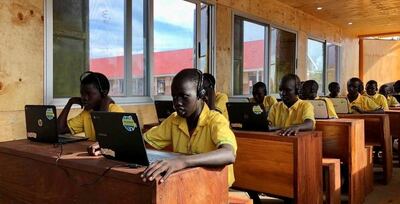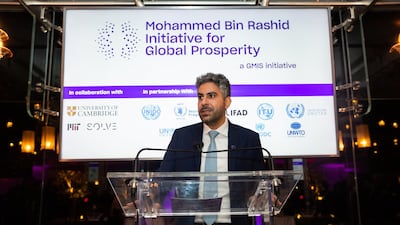Twenty finalists for a $1 million prize set up by the Ruler of Dubai were revealed on Monday, ahead of an awards ceremony in September.
The group of start-ups will deliver their pitches for the Global Maker Challenge, against a backdrop of economic struggles and poverty linked to the coronavirus pandemic, organisers said.
The shortlisted 20 have harnessed technologies such as machine learning, artificial intelligence, smart materials or cloud networks that could help disadvantaged communities around the world.
Finalists include companies with products that connect farmers in the developing world with international buyers, and inventors of fibres that could cut pollution and waste in the global fashion industry.
The Mohammed bin Rashid Initiative for Global Prosperity, which runs the challenge, said the finalists were selected from more than 3,400 entries.
"Innovation is key to controlling the damage caused by Covid-19 and bringing us back to speed towards a more sustainable future," said Badr Al Olama, head of the organising committee for the Global Manufacturing and Industrialisation Summit, which hands out the prize each year.
"We must double up on our efforts in utilising innovation to address humanitarian challenges and offer solutions to the unprecedented challenges caused by this crisis."
The 20 finalists were chosen by Massachusetts Institute of Technology’s Solve initiative and a jury of 47 judges from UN agencies and charities, as well as academics.
Final pitches will be made to judges online because of the pandemic, and will focus on the social impact of their products and campaigns.
Last year, at the GMIS summit in Yekaterinburg, Russia, four companies were handed $100,000 each, while the 12 runners-up were awarded $10,000 each.
India's A2P Energy Solution created a way to turn paddy straw, which is widely burnt off in India generating huge pollution, into pellets to be used in renewable energy.
Canada's Rumie Initiative created a learning platform that required virtually no internet connection to use.
TruTrade impressed judges with its ability to connect smallholders to sustainable food markets in Sub-Saharan Africa, improving their businesses and families' lives.
And India's Garv Toilets was named winner of the Sustainable Cities challenge for its plan to provide low-income urban communities with low-cost sanitation, the lack of which has huge implications for public health and hygiene.
A full list of this year's finalists and details of the event on September 6 are available here.
This year's categories and finalists
Sustainable and Healthy Food for All: How can urban populations increase access to healthy and sustainable foods, despite rapid urbanisation?
The finalists are:
- ColdHubs – provides solar-powered, walk-in cold storage for perishable foods produced by rural farmers in developing countries.
- Ixon – develops advanced packaging technology that enables the sterilisation of food at room temperature.
- Xilinat – created a biotechnological and patented process to transform agricultural waste into a low-calorie sugar substitute that looks and tastes like sugar.
- Stixfresh – developed stickers that create a protective layer around fresh food produce to slow down spoiling, providing economic benefit for small farmers without climate-controlled warehouses.
- Nilus – a social enterprise platform that creates affordable and healthy food digital marketplace for low-income people.

Innovation for Inclusive Trade: How can rural communities increase their access to new supply chains and markets to create better livelihoods for themselves?
The finalists are:
- Agricycle Global – zero-electricity food dryer technology that connects rural farmers to international markets.
- Fantine – blockchain-enabled marketplace that allows coffee farmers to deal directly with roasters and buyers.
- Poket – crowd-sourced registry of offline merchants capable of mapping last-mile rural supply chains.
- Takachar – portable technology that enables small farms to convert crop residues into products.
- ChapChap – digital platform that helps small businesses keep track of transactions and perform basic accounting.

Innovation for Peace and Justice: How can displaced populations access affordable and quality services that are essential to their safety and well-being?
The finalists are:
- Peripheral Vision International – an app that uses gaming and voice response technology to ease learning for refugees.
- ID2020 – a digital platform that allows displaced people greater ownership of their own healthcare records, educational certificates and professional credentials.
- PeaceTech Lab – provider of legal services and technology skills training offered online in refugee camps.
- Simbi Foundation – developer of solar-powered learning hubs that provide access to digital education.
- Aiyin – run virtual reality learning spaces for facilities without the physical and monetary capacity to build real ones.
Climate Change: How can communities move towards a low-carbon circular economy by eliminating waste and using existing resources?
The finalists are:
- AlgiKnit – provides a sustainable fibre for the fashion industry, which is biodegradable, comfortable and low-cost.
- Aquacycl – has built a fuel cell capable of generating electricity from wastewater.
- Queen of Raw – an online marketplace designed for trading unused textiles to reduce landfill.
- Plastics for Change – an ethical sourcing platform that provides sustainable livelihoods and expedites transition towards a circular economy.
- Biocellection – an innovation capable of upcycling unrecyclable plastic waste into performance materials for fashion and 3D printing.


